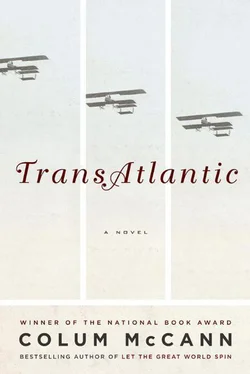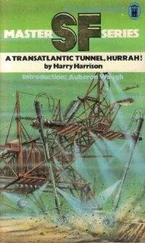That house on Great Brunswick Street seemed far away to Lily now, remote from her in daily custom and sound. The years themselves seemed to forget what she once had been. The shadows of forty years.
SHE WAS NO judge of fine fashion, but for the occasion she wore a long purple polonaise with a fitted cutaway overdress. The amethyst brooch lay high on her neck. Her gray hair was tucked under the curved brim of a mauve bonnet.
She stepped slowly from the horse-drawn carriage and shuffled arm in arm beside Emily who wore a simple alpaca dress. The evening was cool. Dark had just fallen. She was confused by the movement of the light and the close passing of so many bodies. They entered the hotel. Past the granite columns. The bellmen gave them cursory glances. Inside, high piano notes floated through the lobby. The dull pain was deep in her body now. Her hands, her knees, her ankles.
Lily cast a quick look at the large wooden clock in the corner near the bay windows. Too early by far. All around, women stood in expensive shawls and gowns. A few men in black tie and jackets. The fuss and flux. Small pockets of Negroes, too, in the corners. Mostly men. Everyone so finely turned out.
She edged forward. A gauntlet. She was sure they were watching her. She skirted the latticed wall, found a row of landscape paintings to pretend to admire, pulled Emily close.
— Quiet now, she said.
— I didn’t say anything, Mother.
— Hush anyway.
On large wooden easels around the hotel lobby she saw his name. Underneath, the words: National Women’s Suffrage Association .
Small clusters of women walked around underneath the chandeliers. Their serious chatter. Over by the bar, curls of smoke purpled the air. A distant clinking of glasses.
The piano player launched into a new tune. Lily turned to Emily and tucked a stray strand of plaited hair behind the girl’s ear.
— Mother.
— Quiet.
— There he is, said Emily.
Across the lobby, Lily saw him. Douglass was seventy-one years old now. His gray hair still stood in serious abundance. He wore a black jacket and white shirt with standing collar. In his breast pocket, a white handkerchief. He filled out his jacket and had developed a slight slouch, but there was still a heft to him: thicker, wider, yet more at ease. He was surrounded by a group of eight or ten women. They leaned in eagerly towards him. He stood at a slight remove, but then he cupped his hands and made some comment and the women laughed as if they were all part of some intricate clockwork.
He glanced across the lobby. Lily couldn’t be sure, but perhaps his gaze had remained on her. Maybe some movement behind her, some human fuss. When she turned to look at him again, he had already begun walking towards the hotel auditorium.
The room drew in behind him. A gust of air. A wake of light. As if it were all being funneled down to follow him. She felt herself falter. She was seventeen years old again. Standing outside Webb’s house. Bidding him good-bye. The early Dublin light. The shaking of hands. So unusual. The creak of the carriage. Later the butler, Charles, rebuked the staff. How dare you. The smallest moments: they return, dwell, endure. The clack of a hoof against the cobbles. The way he had looked at her as he left. The manner in which he had opened the day. The spectacle of possibility. I have little or nothing here. A small room at the top of a house. A series of back stairs. I as good as belong to them. Owned. She left under darkness. The shame she felt in Cork. At the Jenningses’ dinner table. He did not recognize her. At the dockside, too. He remained saddled. She was no more to him than a sweeping of papers, a wash of the carpet, a broom of the floorboards, a yard of calico. But what had she wanted? What had she expected? She heard the loud braying of the horses. The swoop of seagulls. The rain. She could not look him in the eye. Sheets of rain across her face. A destiny. Stepping onto the boat and away. It was all a confusion. She had been so very young. The ship horn was a relief.
Lily took Emily’s arm and they walked together across the floor. Two policemen stood outside the auditorium door, tapping their truncheons against their calves. They glanced at her, said nothing. The hall was almost full. Rows and rows of women on folding chairs. Their dresses spread out around them.
They took their seats near the back of the hall. She removed her gloves and put her hand upon the back of her daughter’s, rubbed her thumb along the inside of Emily’s wrist.
Douglass was introduced by a pale woman in a plain black tunic. The applause rippled through the air. He stepped up from the front seats. Climbed the stairs at the side of the stage. A slowness that he disguised well. He strode to the lectern. Put his hands upon it, looked out. He was thankful for the introduction, he said, glad to be in a city that meant so much to the many causes of true democracy that he so fervently espoused. There was a slight tremble in his voice.
He paused a moment, then stepped from the side of the lectern as if to show the full extent of himself. His polished shoes, his dark trousers, his jacket trimmed at the waist. His skin was lighter than she recalled. He spread his arms wide, allowed a silence. When the true history of the anti-slavery cause shall be written, women will occupy a large space in its pages . He spoke as if he were saying it for the first time, that he had just found these words in the last few steps across the stage, low now, almost a whisper, a secret to be imparted. The cause of the slave has been peculiarly Woman’s cause . Immediately there was a stir around the room. A stout lady stood and applauded. Several other women followed. There was a shout from a man in the front seat, thrusting a book in the air. Send the nigger home! A scuffle broke out. A flail of arms and legs. The protester was escorted out. Four women left alongside the man. Douglass held his hands in the air and extended the white of his palms. A hush descended. When a great truth gets abroad in the world, no power on earth can imprison it, or prescribe its limits, or suppress it . She could see an orchestra in him, a whole range of instruments and sound. His voice was loud and booming. It is bound to go on until it becomes the thought of the world . He paced the stage. In and out of a pool of light. His shoes clicking on the wooden floorboards. Such a truth is a woman’s right to equal liberty with man. She was born with it. It was hers before she comprehended it. The rational basis for proper government lies in the female soul . Lily could feel the grip of her daughter’s hand, growing tighter now with each moment. There were motes of dust around Douglass in the air, animate and twirling: it seemed as if the dust itself might constitute something.
He put his hand to his forehead as if trying to summon a new idea. He shut his eyes: close to prayer.
Lily thought that he might remain that way, that she, too, would become fixed forever in whatever occurrence his mind had found. She was back on the staircase. He brushed past her to go downstairs. She felt her heart lift. All around her now there were women standing, and the applause rang out around the hall, a series of shouts, but Lily stayed seated, and what she felt was incomparable, singular, yet ordinary, too, all the living moments gathered together in this one, the door of his room closed, a tiny rim of light underneath it, growing brighter in the dark. She understood that she had come such a distance, traveled all this way, she had opened a door, and her own daughter was in the room, her own history and flesh and darkness, leaning down by the light of an ancient lantern, to read.
AFTERWARDS, DOUGLASS WAS ushered quickly from the hotel. A carriage waited outside, the horse clopping its hooves against the cobbles. The night had grown sultry. A hangnail of moon perched above St. Louis. The gas lamps made the darkness unequal.
Читать дальше












